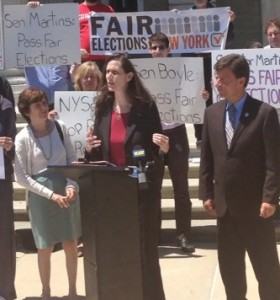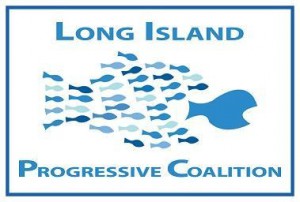
Lisa Tyson, the director of the nonprofit Long Island Progressive Coalition, is just weeks away from her due date—she’s expecting a girl—and days away from the luncheon celebrating her organization’s 35th year of “fighting for social and human dignity.”
She’s got a lot on her plate right now, whether it’s getting her house ready to accommodate a new baby, or making sure that the LIPC’s vitally important fundraiser on March 15 is a success at the Timber Point Country Club in Great River.
But she looks remarkably relaxed for someone whose stated purpose in life is to make things better for future generations, including her own, when the conservative opposition has so much power invested in maintaining the status quo—if not in making things worse.
Taking a moment out of her busy schedule to have lunch in Garden City recently, Tyson smiled as she sat back in her chair at Wild Fig mediterranean restaurant.
“I’ve been doing this for a long time!” says the 42-year-old native of Merrick. “I’m a local girl,” she grins.
Tyson found her way to LIPC by looking through the phone book. She’d gone to the Fashion Institute of Technology and majored in fashion marketing and communications when the first Gulf War broke out. That outbreak provoked her to start questioning the government since the conflict was less about global justice and more about oil. Next she went to Rensselaer Polytechnic Institute to enter the urban and environmental studies masters program, where she was often the only woman in her classes.
Back on the Island in 1995, Tyson met her future husband, John, and managed a music club called the Right Track Inn in Freeport. When it was time to move on, Tyson decided that “there has to be a Long Island organization I can work for, so I went to the white pages and looked under ‘Long Island something-something’ to see what would turn up.”
And so she came to the LIPC, started part-time as a secretary and got hired as a project coordinator. She’s been the director for 12 years.
“It’s the best job in the world!” she says emphatically. “I love it when someone says you can’t do something and you do it.” 
For LIPC, Tyson measures success by how much they can “move the needle.” In 1979, the coalition began as a group of civic-minded volunteers, but evolved into a grassroots membership organization affiliated with the Citizen Action of New York and with a tax-exempt sister organization, the Research and Education Project of Long Island (REP-LI).
Among their achievements, Tyson is particularly proud that her group was able to overcome the state Department of Transportation’s plan to “build HOV lands on every major roadway,” as she puts it, and “we said, ‘Invest in public transit instead!’” One controversial element involved straightening Route 25A through many of Long Island’s most scenic and historic North Shore communities. LIPC launched its “Save 25A” campaign because making the route faster for cars was “not progressive.”
Tyson says she believes in progressivism and populism, “about taking care of the most vulnerable,” she says.
“I don’t do charity work,” she explains. “Charity work is handing someone money. Justice work is changing the tax laws so it’s a progressive tax—so the people who make less pay a smaller percentage in taxes than those who make more.”
She draws inspiration from Jim Hightower, the Texas populist and syndicated columnist.
“He says it’s not left-right; it’s top-down… and that’s where we see ourselves,” she explains. To her, “the conservative movement is about corporate power.”
At LIPC, Tyson has collaborated with a wide assortment of groups—from union workers, affordable housing advocates, environmentalists and even members of the Tea Party.
“I’ll work with anyone on one issue if we can agree and respect each other,” Tyson says. “On other issues, we might not agree but we can be civil.”
Some Tea Party people “did call me the devil,” she admits, “but I laughed… My thing is making change. If I have to eat a little abuse, I’ll take it. I’m not here for an ego boost.”
In her analysis, the Tea Party took root on Long Island “when people realized that their white American Dream, their white privilege, was gone,” Tyson says. “Their kids are getting those Walmart jobs just like the black and brown people are—and they never thought that was going to happen…All of a sudden you can’t afford a house on Long Island; you can’t afford a life-style that you always thought you’d have.”
Besides fighting for social equality through progressive taxation, Tyson strongly supports publicly financed elections to level the playing field so “we have people in office who believe in being in office and not just in making their pockets bigger.”
With that goal in mind, LIPC has been active in the Fair Elections NY project, which has several goals: promote publicly funded elections by matching small donors’ contributions with public money, similar to the system in New York City; set the contribution limits significantly lower; end “pay-to-play” in order to prevent contractors and lobbyists from having undue influence over state business; strengthen enforcement and encourage more transparency in order to make sure the election laws are properly upheld and that public matching funds are appropriately disbursed.
For his support of the Fair Elections campaign, David Calone of Jove Equity Partners LLC, is one of the top people being honored at the LIPC luncheon.
“He’s really put his neck out” on publicly financed elections, Tyson says. “And that is very rare for a business leader… He is a good guy, and he cares.”
So does Tyson and the Long Island Progressive Coalition.






























